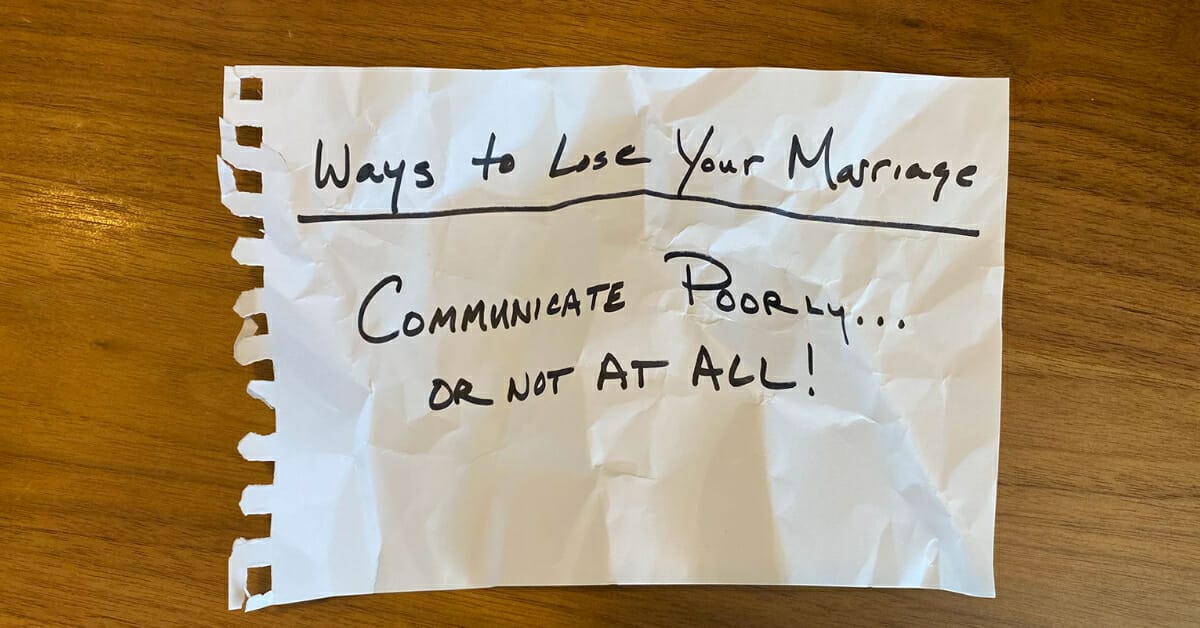 Note: We are currently in a series called “The List.” The list refers to a list of ways you can lose your marriage and is based on information gleaned from over 20 years of counseling records and 20 years of watching marriage fail.
Note: We are currently in a series called “The List.” The list refers to a list of ways you can lose your marriage and is based on information gleaned from over 20 years of counseling records and 20 years of watching marriage fail.
COMMUNICATION – HOW QUICKLY WE FORGET
Communication issues are so common in a marriage they border on cliché. And that’s ironic, considering we spend the first part of our life learning to communicate:
- Learning to speak.
- Learning to read.
- Learning to write our letters and our words.
- Learning to write papers in school.
- Learning to give speeches in school.
- Learning to talk to people, friends, co-workers, and love interests.
But somewhere along the line, we begin to let all of that slide as if we’ve got it down. We…
- Stop talking as much as we use to.
- Stop writing notes like we use to.
- Get lax in using the right words.
- Get lax in using enough words.
We let one of our most hard-earned skills, communication, atrophy from lack of use. And this is sad, because communication is so important.
WHY IS COMMUNICATION SO IMPORTANT?
Improving your communication can sound like the cliché answer to relationship problems. But it’s not that it’s cliché. It’s just that good communication is that important to our relationships.
Good communication is both the lubricant and the connecting tissue of relationships. Just as the oil in your car reduces friction and keeps the engine running smoothly, good communication reduces friction in a relationship and keeps it running smoothly. And just as connecting tissue in your body keeps our skeletons connected, good communication keeps people and spouses connected.
WHAT HAPPENED TO OUR COMMUNICATION?
Why is it that we tend to disregard something we worked so hard to be good at early in our life? Why do we get lazy with something that’s so important? What happened to our communication?
Consider the following possibilities. After we’re out of school, working on our communication skills doesn’t seem like a priority, because we’re not being graded or critiqued on it anymore. After we’ve acquired good friends we get lax about how we communicate, because we’re not trying to earn their friendship anymore. Once we’re married, communicating to win that person over doesn’t seem as necessary, and we shift from communicating to being comfortable. And, the longer we live the more we get in our heads, and the more our dialogue tends to be internal rather than external.
All these possible reasons lead to two primary communication problems: communicating less, and communicating poorly.
HOW CAN YOU IMPROVE COMMUNICATION?
So, how can you improve communication in your marriage? Well, if our problems are communicating less and communicating poorly, the answer is simple. We need to communicate more and communicate better.
Communicate More.
With the exception of those times when one person needs a break from communication for some reason (maybe they’re too upset to talk, or too tired to talk, or they need a moment to think) the more you talk, the smoother things will go and the more connected you’ll be.
I’m not saying you have to drown the other person with tons of words or deep emotion. Communication doesn’t have to be overwhelming or gut-wrenching. It really can be as simple as talking about…
- What you’re thinking.
- What happened that day.
- Things you like.
- Things you don’t like.
- Things you wonder about.
- What you would like to do.
- And yes…what you’re feeling.
Just move the conversation that goes on in your head out to your mouth.
Communicate Better.
Now, let’s talk about communicating better. Oftentimes, we’re hesitant to communicate, because the last time we tried to communicate what we were thinking or feeling it wasn’t received well. If this is often the case for you, try using the UPS model of communicating.
- U – Understand. Good communication starts with making sure you understand the other person. This requires that you first listen. Really listen. And after you’ve done that, then ask questions about what you heard, to make sure you truly understood them. Then, tell them what you think they’re trying to tell you.
- P – Ponder. After you’ve really heard the other person, don’t be so quick to speak. (1) Take a second to ponder what they’ve said and the possible reasons they have for saying it. (2) Take a second to ponder how you can best respond.
- S – Speak. After you’ve done all that, then you’re ready to speak. Speak what you think and feel, but be sure to do it in a way that will be loving and respectful. I know it seems like a lot to go through before you get to speak, but trust me. This process will cut down on a lot of the miscommunication that can take place between you and your spouse…or anyone else.
A FINAL THOUGHT…
I know that talking about improving communication in relationships can seem like such a small thing to harp on. But, communication is really a big thing. The majority of marriage issues that I deal with in my counseling office either center on, or are fueled by, problems with communication. You may think it’s a small thing, but if you don’t do something about this “small” thing, it will turn into a big thing that can eventually cost you your marriage. And that’s why…it’s on the list.
